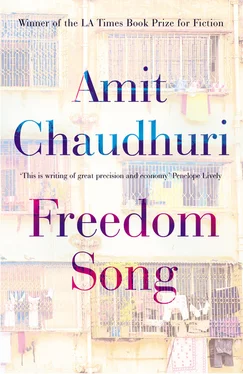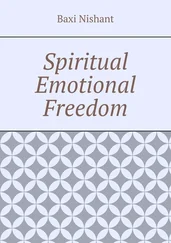She was sleeping with Piyu on the bed; her husband lay sleeping on the divan in the next room. He was snoring, but gently compared to his night-time snores, so that one would not have heard it from the bed that Piyu and her mother were sleeping on, but, moving closer to the doorway, one might have been distracted by a faraway sound that was hardly a sound at all, trapped, urgent, but private. Then, abruptly, one would have realized what it was, and the body with its small belly and bald patch, clothed in kurta and pyjamas, and the frowning mouth and big nose, would have formed around the snore.
On Bhaskar’s mother’s outstretched hand, on the shining dark brown skin, there was, near the thumb and the index finger, a large pink spot like a rose where the skin had peeled off after one drop of boiling oil had leapt on it while she was frying luchis. The yellow Burnol paste that she put there timidly and perfunctorily after stubborn exhortations from Piyu had now faded into what looked like healing dabs of turmeric. She was dark, and slept intensely, while Piyu, beside her, was fair and fresh-faced, a plant that had been nurtured in this garden, in the shadow of pillows, cupboards, shelves, clothes-horses, untouched as yet by life. Let it always be so, the house around her seemed to say, the four walls and the beam on the ceiling, let us always keep her as she is. Let her not leave us. She breathed gently. The sun came in through the clothes-line and printed the wall and the blue bed-cover with triangles and rectangles.
Haridasi, small Haridasi, barely four feet six inches tall, had cleared the dining-table, first cupping her endlessly compliant palm and pushing bits of moist rice and salt that had littered the table into its dark cave, to rest there between her heart line and her life line, collecting bits of fishbone as well to deposit them there, and then curling her fingers as if she were holding a secret and throwing the debris into the kitchen basin, though she had been told not to. She wiped the table after this with a wet cloth. Then she sat in one corner of the kitchen, the only one awake in the house, a guest, a stranger, a friend, and ate from a plate with a heap of rice and a puddle of dal and vegetables on one side. She was quiet as a mouse. Without being aware of it, she tried to mix the puddle of dal uniformly with the huge quantity of rice. She loved rice.
It was today, in the evening, that Bhaskar’s mother would take her husband to the doctor for his annual check-up. For about two weeks she had been persuading him to go, but something else always came up instead. Now, at last, they had a free evening ahead of them. It was a short journey by car, past the Lake Market in Rashbehari Avenue, turning into a lane at whose entrance wheat and grain were piled in open heaps by the roadside. It was a lane they came to seldom, except on these visits to the doctor’s chambers, and they usually forgot where exactly the house was, with its porch lit by one bulb and the narrow corridor, smoke-filled in the winter, that ran next to it, inward to the green waiting-room at the back. The lane seemed far away and strange, and yet, in reality, was only a short distance from Khuku’s house, and from the lane in which Bhaskar’s mother’s sister lived, and Piyu’s college, and Lake Market where, once or twice a week, Bhaskar’s mother bought fish and vegetables. Once the visit was over they immediately went to the Fern Road Pharmacy and bought the medicines that had been prescribed, and proceeded without further delay to a relative’s house.
Bhaskar’s father had a great, childlike respect for this doctor. Though he was himself an engineer, the doctor was what in his youth some of the brightest young men went on to be: an FRCP from London. Those were the days when young men went to England, not America, and came back with degrees and sometimes even an English wife who wore a sari. The letters FRCP made Bhaskar’s father feel that both he and India were suddenly, completely, though temporarily, young again. Each time he went there, he signed his name on the compounder’s slip and sat in the waiting room with his wife and the other patients as shyly as if he were visiting his in-laws, flicking through, meanwhile, old copies of Span. Once they were inside, he loved listening to the doctor’s diagnosis and asking questions about the prescription, not because he doubted the doctor but because he always wished, whenever he had the opportunity, to widen his own limited, though not negligible, knowledge of medicine. The doctor was a mild, slightly boring man whom time had passed by; he wore black-framed bifocal spectacles and had small tufts of black and grey hair coming out of his ears. He was content to see fewer patients these days and sit behind his old wooden table with its green leather top, his arms resting behind a glass paperweight with little flecks of pink and blue suspended in its strange, crystalline atmosphere, and talk in a leisurely way about his son who was studying at Caltech, and in winter, about all the marriages that were now underway in the city. Behind him, on the wall, there were two framed photographs — the class of ’49 in Calcutta Medical College, and the class of ’55 in London, the students mostly men, with recent, smart, close-cropped hair-cuts.
Now an interminable mail-train passed on the railway tracks that formed the horizon that could be seen in the gap between the houses on the other side of Vidyasagar Road. For a while, all other local and habitual noises, of birds and cars, were subsumed under the long, swelling note of the mail-train whistle, which, with its lone trumpeting, made the air vibrate around one. But yet they slept in that vibrating air. Then, when the train had gone, the air was cleansed, and the room was as quiet as its reflection in the dressing-table mirror, with Oil of Ulay, Lactocalamine, Vaseline, Pond’s Dream Flower Talc, and two lipsticks arranged carefully, with all devotion and seriousness, on the shelf before it. Very slowly, like town officials who had respectfully ceased their transactions for a minute, the crows and sparrows began again, but sounding more distant now, even chastized, perhaps in comparison to the grand interlude of the train whistle. In this new, petty, semi-silent, post-whistle moment came the postman to Vidyasagar Road, dressed in civilian clothes, a dark red sweater, a full-sleeve shirt whose broad collars were hidden by the sweater’s neck, and black terry cotton trousers with bottoms that were wide and floppy; on his shoulder there was a hand-woven cotton sling bag such as college students swing casually and thoughtlessly by their sides, crammed with neat, though uneven, stairways of letters, a small blue aerogramme climbing up to a broad brown-paper envelope, which rose again to a disproportionately small inland postcard. This frail man, eclipsed almost entirely by his sweater and his trousers, now, retrieving more and more piles from his shoulder-bag, seemed the paradigm of modest, unattractive, but real generosity, as he, without any special demonstrativeness or affection, left at least one letter in every letter-box on his progress from one house to another. In the yellow-green letter-box by the gate to Bhaskar’s house there came a wedding card with ‘Shubho Bibaho’ inscribed on the envelope; on the card inside, embossed in fine gold lines on a red background, a wedding procession moved forward, looking as wedding processions might once have looked, with a palanquin and red and gold revellers in profile, wearing turbans and blowing pipes and beating drums and making an infernal racket. There was another card, announcing a funeral, with ‘Ganga’ printed in Bengali on the envelope. Lying on it was a yellow postcard from Bangladesh, sent by a distant relative; one half of the square, divided by a vertical line from the other, had clean horizontal lines that had been meticulously loaded with Bhaskar’s father’s name and his address, and the numbers of the pin code imprisoned inside tiny printed boxes. The letter, written in blue ink, began on this side with pleasantries and general reminiscences and then came, in its tidy persistent way, to occupy all of the other side, ending with a plea for financial help for a daughter’s marriage. Like a house which shelters sons, daughters, grandparents, servants, frustrations, expectations, a whole world under its roof, the postcard, with not one inch of it wasted, gave whatever space it could to words that expressed both necessary sentiments and urgent requirements. And there was a letter from Robi, a nephew in Pennsylvania, with photographs of his daughter enclosed, now seven. He had once lived in this house as a student. The one-dollar postage stamp, with Lincoln’s picture on it, would be acquired by Mohit for his collection.
Читать дальше












